- Home
- Al Sarrantonio
Summer Cool - A Jack Paine Mystery (Jack Paine Mysteries) Page 4
Summer Cool - A Jack Paine Mystery (Jack Paine Mysteries) Read online
Page 4
Paine gently took the paper from her; if she had been halfway back before, she was back to zero again. She clasped her hands together, not finding the solace she needed, and then she leaned into Paine, folding against him, her hands opening to clutch him, digging into him as if he was a human life raft. She began to weep again, and he felt her body shaking against him.
"Oh. . . Jack. . . I still thought. . . maybe he was just drunk. . . just on a bender, maybe he. . . was calling from a bar somewhere nearby. . . . I was stupid, but. . . I still hoped. . ."
Paine put his arm around her and held her, and let her cry. And with his other hand, he held the paper up and looked at it, and knew now that there was somewhere to go.
7
Paine had picked up his phone to dial when Anapolos came into his office. He put the phone down.
"Sit down," Paine said.
"I'll stand, Mr. Paine," Anapolos said. He was a short man who always looked as if he were charging forward. His head was large, nearly bald. The top part of his body was barreled, on top of short legs. He was a Greek from Astoria, Queens, whose brother-in-law had sold him a building in Yonkers, telling him that it was a way to get rich and make his sister happy. Paine knew that the brother-in-law had been right.
"This. . . letter I get from you, Mr. Paine," Anapolos said, waving a folded sheet of paper. "I don't like it."
"You weren't supposed to like it," Paine said. "I had a lawyer look at it before I sent it to you. He said I was right on every count, and that, if I wanted, he'd help me bring you to court."
The top of Anapolos's head reddened. He leaned closer to Paine's desk, hammering the paper down on it and raising his hand into a fist. "You are not a good tenant, Mr. Paine."
"You're a shitty landlord, Mr. Anapolos. When I moved in here in February there was no heat. I've seen five different species of roaches. There is at least one family of rats on this floor; I've seen others on outings in the lobby and in the storage area in the basement." Paine pointed to the piece of paper Anapolos had put on his desk. "I listed enough building code violations, especially blocked fire exits, in that paper to have you shut down and fined till it hurts. The lease I signed with you promised air conditioning, and that microwave oven in the window hasn't worked since GE put it together in 1963. I don't like the way you run your building, Mr. Anapolos."
"And I don't like you, Mr. Paine. You're not a nice young man."
"I'm not so young, Mr. Anapolos."
Anapolos straightened slightly, put his hands on his hips. Paine was suddenly reminded of pictures he had seen of Mussolini. He almost laughed.
Anapolos raised one finger, and suddenly Paine did laugh. "This is not funny, Mr. Paine. I am going to have you evicted." Anapolos pronounced the last word like a curse. Paine shook his head; he could not stop laughing.
"You will hear from me again, Mr. Paine!" Anapolos said. With a flourish he spun on his little shoes and walked to the door, leaving his paper behind on Paine's desk.
Anapolos opened the door, closed it loudly behind him.
"Jesus Christ," Paine said. He took the paper Anapolos had left, slipped it into a fresh envelope, addressed it to the landlord and put it in his out box.
This time he picked up the phone and punched in a number.
The 800 number rang twice and he was connected to a computer voice that asked him to wait until an operator was free. Phone music played. Paine angled the phone away from his ear until a voice came on the line; it was the computer voice, asking him to please be patient. The music came on again. Paine moved the phone away from his ear until a human voice said, "American Airlines, may I help you?"
"I hope you can," Paine said. He made himself sound chagrined. "I'm sorry to bother you about something stupid, but I think I'm in trouble with my boss. A couple of days ago I took flight eighty-five out of New York, and I lost my ticket receipt. I . . ." he paused, sounding embarrassed, "well, my boss isn't the kind of guy who believes what you tell him, and I was wondering if you could get me some sort of copy of the receipt, a Xerox or anything, just to prove I took the flight. My name is Bob Petty."
The cheery girl's voice said, "I'm certain we can help you, sir. If you'll just wait a moment. . ."
Paine waited; he could hear the soothing tap of computer keys, the pause while the information he wanted was pulled up onto a screen. There was another pause. More muted key tapping.
"That would be Robert Perry?" the soothing voice asked. Paine said yes. She confirmed Perry's address. "That was a one-way ticket to Dallas-Fort Worth?"
Paine said yes again.
"All right, sir. I can have a receipt mailed to you. You are aware that it will be marked duplicate?"
"That's fine," Paine said.
"Is there anything else I can help you with?" the soothing voice said.
"Can you tell me if I connected with another flight?"
There was another pause. Paine didn't hear the immediate tapping of computer keys. He could imagine her trying to put his question into a form that made sense to her.
"Certainly, sir," she said, a little less cheerfully. She probably hadn't succeeded. But he heard the keys tap.
"I show only a one-way to Dallas-Fort Worth, sir. Would you like me to try the other airlines?"
"Please. I have a lousy memory."
A longer pause. No cheerful voice this time. But the keys tapped.
"I show only a one-way on American to Dallas-Fort Worth. Is there anything else I can help you with?"
"Nothing today, thank you."
"Thank you for flying American, sir," she said.
"Sure."
He hung up, and then called the 800 number back He got more recorded messages, more music, and then another cheerful voice came on and he booked a flight to Dallas-Fort Worth.
As Paine dropped the phone into its cradle it rang. He put it back to his ear.
"Paine?" someone said.
"This is Paine."
"Kevin Bryers. I'd like you to come in and talk, when you have a chance."
"Sure, Chief Bryers. But I won't have a chance for a couple of days."
Bryers paused. "All right. It's about Jim Coleman."
"Not Bobby Petty?"
"That's part of it. Mostly Coleman."
"If it was about Petty I could come now. Too bad."
"You'll come and see me?"
"You going to offer me my old job back, too?"
Bryers didn't laugh. "We'll talk," he said.
"Sure."
Paine hung up the phone, punched another number. It rang a few times, and then a sleepy voice came on.
"Wake up, Billy, I'm coming to see you," Paine said.
"Jack?"
"Yes." Paine gave his flight number, time of arrival.
"Great. You coming down to look through my telescope?"
"Not this time, Billy. Business."
"But we can talk."
"Great." Billy yawned. "What was that flight number again?"
Paine gave it to him. "I take it you were out all last night?"
"Yeah."
"Good skies?"
"Real good. Hot as hell, though."
"Go back to sleep, Billy."
"You bet I will. See you later."
Paine hung up the phone. This time when he put the receiver in its cradle, it stayed mute. He fumbled with the message machine for a few minutes until he was reasonably sure it would work, then locked the office and went home to pack.
8
Of all the airports Paine hated to fly into, which was all of them, he hated Dallas-Fort Worth the least. There was something about the wide openness of it that inspired confidence. Whenever he came into LaGuardia Airport in New York, he felt as if the pilot were dropping straight down into New York City. If they came in too short they'd be in the water; too long, they'd be on a sidewalk on Fifth Avenue, slamming into the front of Tiffany's. But in Dallas there was prairie to spare; for miles around everything was flat and runway-like, and, to Paine's min
d, the pilot had plenty of room for plenty of errors.
Which wasn't the case, of course; Billy Rader had gleefully informed Paine that Dallas-Fort Worth has a terrible wind shear problem; tornado swirls can rise up out of nowhere, and thunderstorm clouds have a way of rising like tall black walls up to God and slamming rain and hail and wind into everything.
But so far Paine had seen none of this, and today it was high and blue and hot when the plane touched down.
Billy Rader was waiting for him at the gate, smiling through his full beard as he took Paine's bag.
"See the wreck on the way in?" he asked in his pleasant drawl.
Rader continued to smile. "A 737 buckled its right landing gear yesterday. Slammed into a parked L10-11. Last week we had a near miss between a Delta and Texas Air. Last week an American flight, might have been yours, nearly flipped in the wind." His grin widened. "I know how much you like this airport."
"Did I say that?"
Rader laughed, moving them to a pair of empty gray padded seats in the waiting area. He sat down, stretched his legs. "Okay, Jack, what's up?"
"Remember Bob Petty?"
"Sure. Couldn't get him to look through the telescope, but he was a good fisherman."
"I'm trying to find him. He took a one-way here two days ago. Left his wife and kids and job."
"Jesus. Didn't seem like the type."
"He isn't. Thing is, I don't have any idea why he came to Texas. As far as I know, the only time he's ever been here was that one time with me. He's never mentioned anything about the state, except you and those fucking catfish."
Rader smiled, slapped Paine on the shoulder. "We can't all be good at everything, Jack. If I remember correctly, you did have a nibble."
Paine said nothing.
"Well," said Rader, laughing, "if we get some work done, maybe we can get some viewing in tonight."
"Fine," Paine said. "You still got all those friends in this town you're always talking about?"
"Follow me," Rader said, handing Paine his bag and stretching to get up.
Paine waited on a red plastic seat while Billy Rader talked at the Avis counter. He was there a longtime. Whenever Paine looked at him, Rader seemed to be laughing, and the young woman he was talking to laughed back. Finally, the young woman left the counter and Rader followed her into an office. The door closed.
A half hour passed. When the door opened, Billy went back to the counter with the young woman. He leaned on it casually, laughed, and the young woman laughed.
Finally, Billy left the counter and came to where Paine was sitting.
"He didn't rent from Avis," Rader said.
Paine was about to say something when Billy held his hand up. "But he did from Budget. I had to wait for her to access the big computer in the back, with all the insurance stuff in it. The big companies share it. He rented a blue Chevy Cavalier and is staying at a Best Western in Fort Worth. We can get there in a half hour!'
Paine smiled in admiration.
"I told you we'd get to use the scope tonight," Rader said.
It was nearly 100 degrees outside the terminal. Paine looked at his watch. Six o'clock. Which meant it was five in Dallas. And 100 degrees.
"Humid, too," Rader said. "Been dripping like a pig for days. I told you it was hot last night. Seventy-five at three in the morning."
"It wasn't even this bad in Yonkers."
"Welcome to Texas!" Rader laughed.
They got into Billy's Ford Galaxy; air conditioning shot out at Paine as Rader gunned the engine.
"Jesus!" Paine said, relishing the cool.
"Feels good, doesn't it?" Billy said. "Let's hope the air conditioner in your friend's room is on."
They reached the motel in almost exactly half an hour, still arguing about what to listen to on the radio. Laughing, Rader won out, threatening to kick Paine out into the hot air unless Dwight Yokum stayed.
"Back in a minute," Rader smiled. He left the keys in the ignition so the radio would stay on.
Paine turned the knob off as soon as Rader was gone. Billy was back almost immediately. Bending to get into the car, he smiled, reaching over to snap the radio back on. "Room 414," he said.
They parked in front of the right stack of rooms, looked for the rented blue Cavalier, which wasn't there. When they had trudged the stairs to the fourth level, stopped before room 414 and knocked to no answer, Paine said, "He's not here."
"He didn't checkout of the motel," Rader said, producing a room key from his pocket, slipping it smoothly into the lock and snapping it open, "so who cares if he's here or not?"
"Is there anybody in Texas you don't know?" Paine asked, as they entered the room.
"Just the border guards," Rader answered, laughing, "because I've never left."
Paine snapped on the light.
The room looked recently lived-in. The sheets on one side of the double bed were rumpled; a pair of chinos was draped over the back of the desk chair. A new-looking gym bag was open next to the desk; inside were white socks, boxer shorts, a couple of open-necked shirts, one of them still in its plastic wrapping. The waste basket next to the desk had other opened wrappings in it: a toothbrush box, six-pack of white crew socks, underarm deodorant. The writing pad on the desk was unused.
Paine was checking the night table next to the bed when Rader called to him from the bathroom doorway.
"Don't think you're gonna like this, buddy."
Paine joined him.
Inside the bathroom was a lot of blood. It brightened the white tile around the tub like fresh paint; one smeared section at the back wall resembled a modernist painting, bold downward finger strokes ending in a nearly perfect bloody handprint. The hand that had made it was nearby, cocked away from the wall at a frozen angle. The rest of the body was attached to it except for the head, which was missing.
Rader flipped up the bloody toilet seat with the toe of his boot; inside, staring up at them dolefully from a pool of bloody water, was the missing head.
"Jesus Christ," Billy Rader said.
Paine said, "It's not Bobby Petty."
9
A cop named Landers talked with Billy Rader while Paine sat outside the office. Paine heard them laughing. After a while Rader came out, squeezed Paine on the shoulder, kept on walking toward the female dispatcher who had smiled and motioned to him from across the room.
"Come on in, Paine," Landers said, and Paine stood and entered the office.
Landers waited for him at the door, and closed it behind him. He walked around to his side of the desk, and they both sat down. Landers was short and thin, with a pinched, leathery face. He wore a light tan cotton suit with an open-necked shirt.
It was hot in the office. The window was halfway open, letting hot air in, and a rotating fan in one corner next to a row of old oak filing cabinets blew the hot air around.
"Well," Landers said, scratching his cheek before looking at Paine, "if you hadn't been with Billy Rader, you'd be in deep shit. Way I see it, you're still in shallow shit. But that's okay, as long as you do what I say."
"Billy's all right," Paine said.
"Billy?" Landers looked as though his train of thought had been interrupted. "Billy's the best fucking reporter in Texas. He's the only reporter I've ever known who spent time on the force, and the only one who knows what kind of crap we have to put up with. He's always been fair. You're lucky he's a buddy of yours."
"I am," Paine said.
"But you're still in shallow shit. You're from New York, and I don't like New York detectives down here, especially when they don't check in with me."
"I'm not from New York City. I'm from Yonkers."
Again, Landers's train of thought had been derailed. "That don't make a shit of difference to me. New York is New York."
"We like to think there's a difference."
Landers held up his hand. "Enough chitchat," he said. "Here's the deal, and the only deal. I want you out of Fort Worth tonight. And out of Fort Worth mea
ns out of the state of Texas. Billy told me what you're up to. If your friend shows up I'll call you. Right now your friend is in the deepest shit there is. He rented a hotel room, and then left it with a headless body in it. I don't know about New York, or Yonkers, but we don't like that kind of business in Texas. But you're not going to do anything about it. I am."
Paine sat silent.
"Is this getting through to you?" Landers asked.
"Sure."
"I'm not kidding, Paine. I find your ass in Texas tomorrow morning, and I'll haul you in on suspicion of murder. I can do it, and I'd enjoy it."
Paine stood, drew out one of his cards and dropped it on the desk. "You'll let me know if Bobby Petty shows up?"
Landers reached over, took the card, put it down in front of him. "As long as you're back at this New York number, I will." He stood, held out his hand. "Nothing personal, Paine. Especially as you're a friend of Billy's. We just do things our own way here."
"Everybody does," Paine said, not taking the hand, leaving the office.
Paine extricated Billy Rader from the laughing dispatcher and a group of three uniformed cops he had gathered. They went out into the dusk. The sun was lowering, but the heat wasn't. They stood for a minute, feeling the heat, watching the clear, cloudless sky turning purple toward blue-black.
"He tell you to go home tonight?" Rader said.
"Yes."
"He meant it. Landers can be mean as a rattlesnake."
"He's a cop," Paine said.
Rader laughed. "Ain't we all. You, me, Bobby Petty, Landers. Just a bunch of fucking cops." He studied the sky, seemed intent on one purpling section about thirty-five degrees up from the horizon. He squinted, and then grunted with satisfaction. "North star looks good tonight. Not twinkling. Be a good night for seeing." He cocked his head toward Paine. "Landers said you had to be gone by tonight?"
Paine nodded.
Rader smiled broadly. "Nights go from dusk to dawn in Texas this time of year," he said.
"Okay, Billy," Paine said.
By true nightfall, they had reached Billy Rader's observatory, forty miles north of Arlington. There was a glow to the south, from the big twin cities area, but it was blocked by low hills and cottonwood trees and the sky overhead was black and clear.

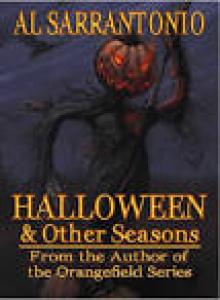 Five World Saga 01 Hornets and Others
Five World Saga 01 Hornets and Others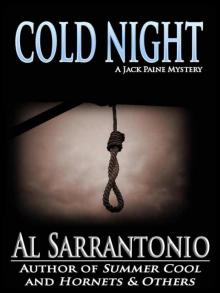 Cold Night (Jack Paine Mysteries)
Cold Night (Jack Paine Mysteries)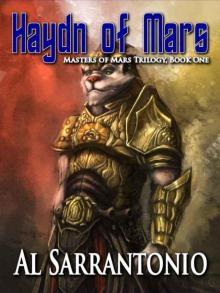 Haydn of Mars
Haydn of Mars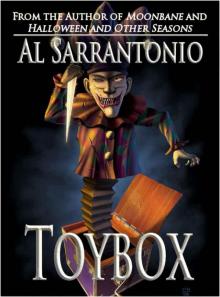 Toybox
Toybox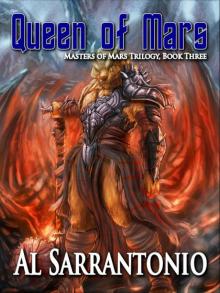 Queen of Mars - Book III in the Masters of Mars Trilogy
Queen of Mars - Book III in the Masters of Mars Trilogy Exile
Exile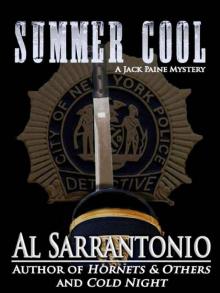 Summer Cool - A Jack Paine Mystery (Jack Paine Mysteries)
Summer Cool - A Jack Paine Mystery (Jack Paine Mysteries) Return - Book III of the Five Worlds Trilogy
Return - Book III of the Five Worlds Trilogy The Orangefield Cycle Omnibus
The Orangefield Cycle Omnibus Summer Cool jp-2
Summer Cool jp-2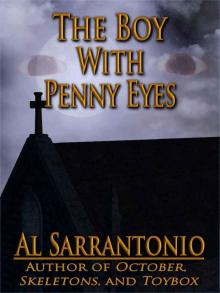 The Boy With Penny Eyes
The Boy With Penny Eyes Journey - Book II of the Five Worlds Trilogy
Journey - Book II of the Five Worlds Trilogy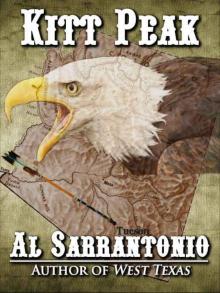 Kitt Peak
Kitt Peak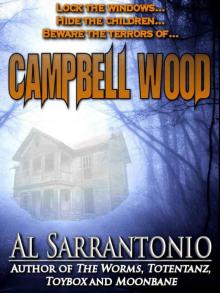 Campbell Wood
Campbell Wood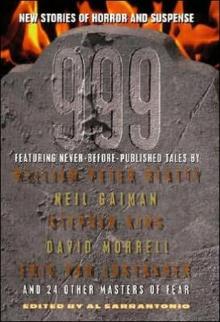 999
999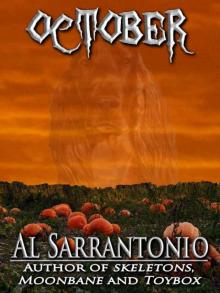 October
October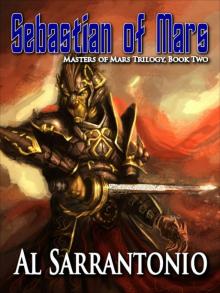 Sebastian of Mars
Sebastian of Mars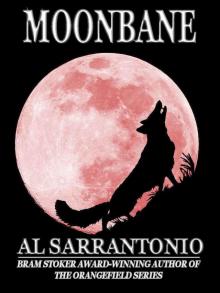 Moonbane
Moonbane Totentanz
Totentanz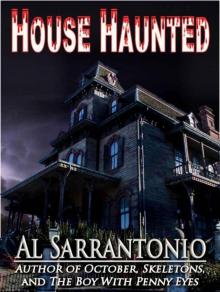 House Haunted
House Haunted Halloweenland
Halloweenland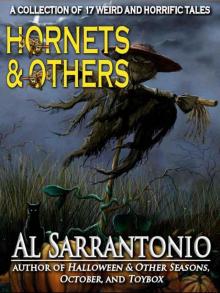 Hornets and Others
Hornets and Others